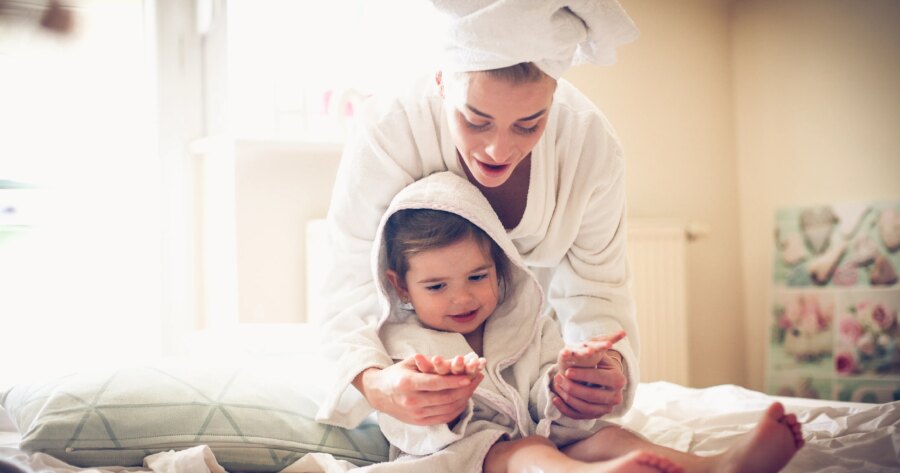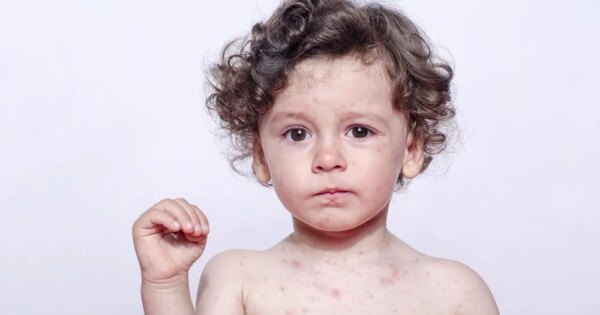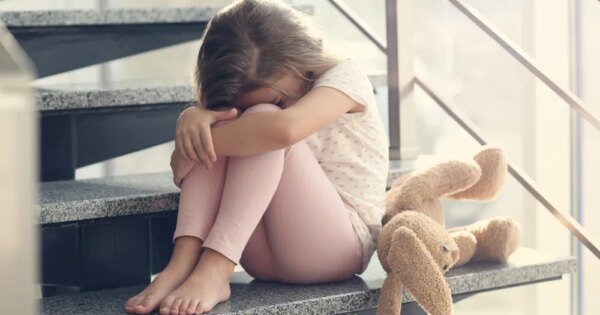Adjusting to life with kids brings with it a steep learning curve. Overnight, it seems like there are a million more things on your plate to do and plan for. As a mom of two, I have learned that the best way to minimize stress as a parent is to simplify the routine your child is on. How can you do that? Easy.
One huge thing that will help both you and baby relax more is to not bathe them as much. Say what? Isn’t this a commandment step all of the parenting books tell you must be followed, especially in the evening bed time routine? What if I told you it’s actually beneficial for your child not to be bathed as much?
I’m not saying you shouldn’t bathe a very dirty child who just played in the mud or often wash your hands. But do babies who don’t do too much or get a lot of cardio really need more than just a quick wipe of the bum?
Check out these 12 Reasons You Should Bathe Your Kids Less and thank me later for the time saved.
12. Frequent Bathing Could Dry Out The Skin
A baby’s skin barrier is 30% thinner than an adult’s and twice as likely to dry out over time than ours is. The more anyone bathes, the more the natural oils that keep skin supple and hydrated are washed away. When it comes to babies, less time in the bath is best, especially when soaps and body washes are used that can further irritate their already sensitive skin.
To prevent your child’s skin from getting too dry, which could lead to itching and scratching, apply a lotion specifically for your child’s age as soon as they get out of the bath to lock that moisture back in.
11. Bathing Newborns Too Often May Increase Exposure to Chemicals
The younger a child is, the more susceptible they are to absorb chemicals in our environment (indoor and outdoor pollution), our furniture (from mattress to rugs) and those in our products our skin comes into contact with (think laundry detergent and lotions).
In fact, research shows that skin barrier development is a long process that doesn’t just mature once a baby is born. The skin barrier is the skin’s outermost layer that when efficient, stops irritants and allergens from penetrating us, and moisturize from escaping. In the first year of his/her life it becomes essential to limit a baby’s exposure to irritants as their skin takes a while to become stronger. This is why premature babies especially have a high skin barrier dysfunction and an increased mortality rate. Since little kids can lose their skin’s water content at a quicker rate than adults, it is vital to do as much as possible to keep their skin hydrated and that skin barrier thick. Cutting down on bath times can do just that.
10. A Bath A Day May Cause Skin Damage
When my kids were born, I decided to wait about 10 days to give them their first baths. I knew from my childbirth and doula background how beneficial it was for the vernix (the white stuff that covers your baby when they are born) to stay on their skin as long as possible. Even the World Health Organization promotes waiting a few days to wash your child since the vernix acts like a moisturizer and antibacterial property. Studies show that especially when they are newborns, transepidermal water loss (TEWL) and cord infections occur more frequently with children who are fully submerged in tubs or cleaned with a washcloth rather than those not washed at all.
If you do need to put water on your babe, try exposing them to a bath of 10 minutes or less or just spot clean more often.
9. If You Bathe At Nighttime, It Might Actually Energize Your Child
Ask any parent, even those who aren’t responsible for bedtime, and they’ll likely have heard that giving your child a bath at night will relax them. Just what an exhausted parent and over-stimulated little baby need, right? But have you heard of water actually being a stimulant for your child in its own right?
Don’t get me wrong – plenty of children find warm water soothing and enjoy the bonding that happens during bath time. It’s a great activity for the lesser involved parent to do, too, to build the connection to their child. But when you think about it, many stimulating things happen during a bath – bright bathroom lights, rushing taps, the sensation of water on the skin itself, those shivers coming out of the tub into colder air brings. Both my kids definitely cried a lot in that in-between stage of coming out of the water and putting on some clothes – especially since you have a few things to do before the pyjamas are on – like moisturize and change diapers.
8. Overly Dry Skin Could Increase Food Allergies in Kids With Eczema
25% of babies and 1/5 of toddlers will have enough hypersensitive skin that it will become eczema. While it can be a physical discomfort that causes cracked skin, itchiness and emotional upheaval in your child, it may also expose your child to food allergies earlier than usual.
Studies have shown that children whose first exposure to food is through cracked skin could be more prone to have food allergens affect their immunity in a negative way. If foods are first introduced by eating and need to travel through the digestive tract, kids may build more tolerance to them. Bathing your kids is a quick and effective way to curb dry skin.
7. Over Clean Living May Be Bad For Your Child’s Immunity – At Any Age
I’ve already touched on the reasons we should bathe our babies less. But it’s good to know that even the American Academy of Dermatology doesn’t recommend more than 1-2 baths a week for kids 6-11 years old. One large reason may be that it benefits kids to be exposed to dirt and good bacteria to boost their immune system. The bottom line is that kids who bathe less frequently may also get sick less often.
It’s hard to come to terms with that when we live in a world where most parents carry a big bottle of hand sanitizer in their bag and a small one attached to their keychain. But many skin experts have let us in on the detriments of stripping the skin of protective oils on a daily basis by washing.
6. An Expected Daily Bath May Complicate Things If You Have 2+ Kids
Long gone are the times where both parents work regular 9-5 jobs, meaning that often one parent takes on the brunt of bath time, especially if it’s part of a child’s bedtime routine. Handling more than one kid is hard enough as it is, let alone needing to bathe one while entertaining the other – especially if the kids aren’t close in age.
If a bath is engrained in your child’s bedtime routine since birth, they will come to expect it and potentially be unable to fall asleep without it. If you, then, add another baby to your family you’re just asking for chaos at bedtime – until both kiddos are old enough to share the tub.
5. Not Only Your Water Ends Up In The Drain – Your Money Does, Too
Let’s look at the pragmatics of not bathing your child daily. It simply costs a lot of money to fill the tub with all that water. Think about this – a typical bath takes up from 60-90 L of water and adults are recommended to drink around 2.2 L a day. This means that each time you fill a tub deep enough, you have a visual of how much water you should be drinking in, gasp, 1 month.
If that’s not enough to shock you, maybe the financials will once you look at your bills before and after kids. The cost of raising a child these days is hard enough without paying attention to the amount of water you’ll spend with little people in your house.
4. It’s Less Hassle For You As A Parent
I can’t be the only one out there that dislikes the whole process of bathing kids in general. Not even because of the potential negatives I’ve mentioned here, but for the sole fact that it takes energy out of me I just don’t have – especially at the end of the night.
I cringe thinking about slippery baby skin or toddlers splashing me in the face so much that I (very early on) made sure bath time, whenever it would occur, was daddy’s job. These days I take a more active role in it – especially since we have 2 kids at home – but eliminating the amount of times you have to crouch next to that tub and risk potential backaches sounds fantastic to me.
3. You Lessen Exposure To Hazardous Moldy Toys
In this day and age many people know about the potential mold certain rubber bath toys can become filled with – especially if exposed to daily dunking and tossing in water. Yet I find that most parents still buy bath toys to keep their children entertained in the tub without blinking twice about what kind of toy they are getting.
If the toys are left out and don’t properly dry up all moisture, the perfect breeding ground for mold is created. Mold can become a health hazard for kids with low immunity and the only way to truly see if a toy is affected is to cut it open.
2. It Opens Up More Time For Other Things
Considering bath time takes up a good chunk of time, from picking out the clothes for afterwards, getting towels, ensuring water is at just the right temperature, putting something on that you’re fine with getting wet, moisturizing – you get the jist – it’s safe to assume that time could be allotted to so many other beneficial things.
If bath time is around 30 minutes, you could have gone on a nice walk with your child, completed a load of laundry, and had your kid spend some quality time playing with the parent he or she sees less in the day while you step aside for some well-deserved me time.
1. You Save Yourself Unnecessary Clean Up
I know bathroom markers are all the rage these days and apparently they’re erasable – but I can’t think of them without thinking of all the stained tile grout parents told me they end up with. Even without these elaborate toys, kids are bound to spill some water either on you or on the floor you’re kneeling down on. In any case – you’ll get wet and should probably wear a raincoat.
While it’s definitely entertaining for your child to get wild in the tub, it’s also a headache having to get yet another towel to soak up those spilled suds or blow dry your own hair thanks to the mini-shower your babe may give you.















